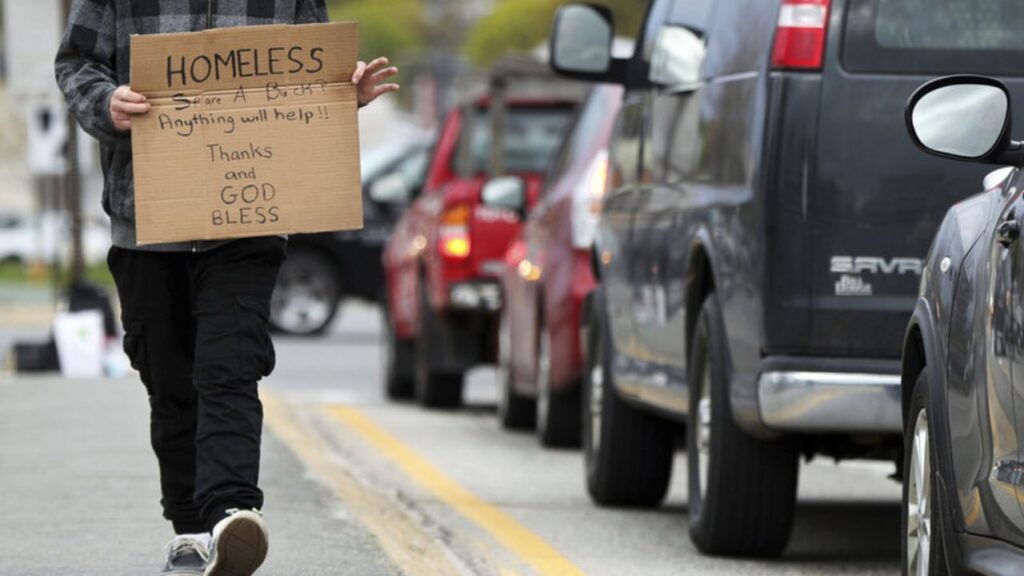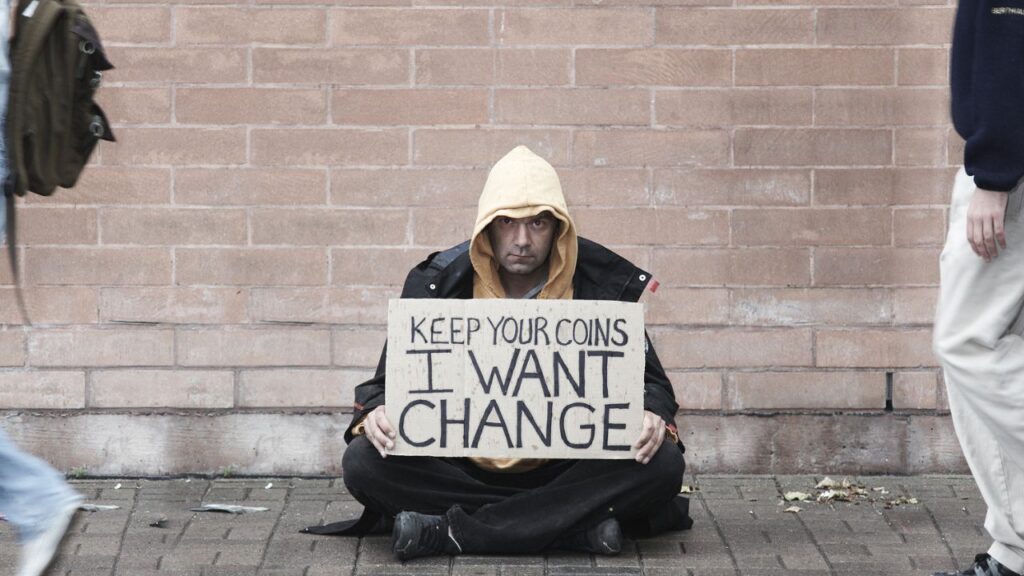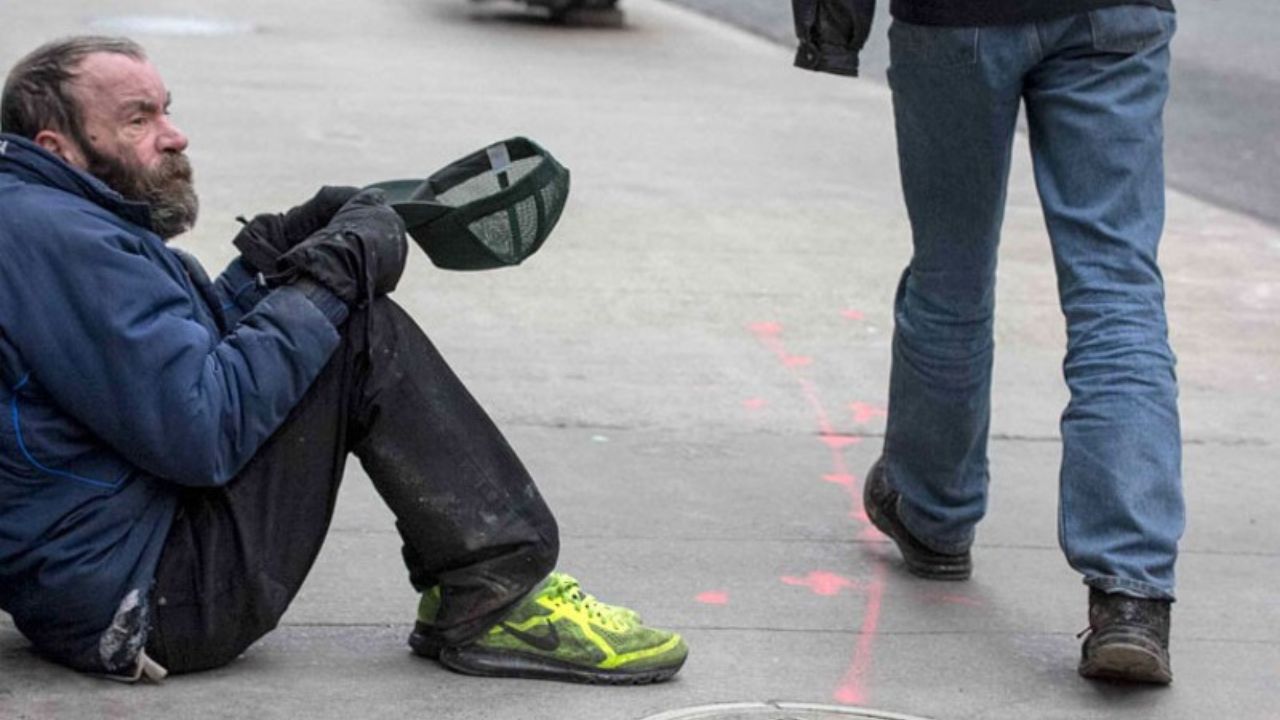Is Panhandling Illegal In Texas? Panhandling in Texas is generally not illegal statewide, but local ordinances in cities like Dallas, Houston, and Austin regulate or ban aggressive or obstructive begging.
Panhandling, the act of soliciting donations from the public, is a visible aspect of many urban areas in Texas.
Whether it’s on street corners, near traffic lights, or outside stores, panhandlers are part of the cityscape, sparking ongoing debates about public safety, personal freedom, and social responsibility.
The question of whether panhandling is illegal in Texas does not have a straightforward answer, as laws differ across various cities.
This article will provide an in-depth exploration of the legality of panhandling in Texas, how different cities regulate it, and what it means for residents, panhandlers, and policymakers.
Contents
- 1 What Is Panhandling?
- 2 Is Panhandling Illegal in Texas?
- 3 City-Specific Panhandling Laws in Texas
- 4 Why Are There Different Laws for Panhandling in Different Cities?
- 5 Consequences of Violating Panhandling Laws in Texas
- 6 How Do Texas Cities Address Homelessness and Panhandling?
- 7 Final Verdict
- 8 FAQs
- 8.1 Is panhandling considered a criminal offense in Texas?
- 8.2 Can panhandlers be arrested for begging in public places?
- 8.3 Are there any permits required for panhandling in Texas cities?
- 8.4 What should I do if I encounter aggressive panhandling?
- 8.5 How can cities balance public safety and the rights of the homeless?
- 9 Conclusion: Is Panhandling Illegal In Texas?
What Is Panhandling?
Panhandling, also known as begging, is a practice where individuals ask for money, food, or other forms of assistance from passersby in public spaces. [Is Panhandling Illegal In Texas?]
It is often associated with homelessness and poverty, but the reasons behind panhandling can be complex and varied, including mental health issues, unemployment, or lack of access to social services.
Panhandling can be classified into different types:
- Passive Panhandling: This involves sitting or standing in a public place with a sign or container, silently asking for donations without directly approaching people. This form is generally less regulated unless it occurs in prohibited zones.
- Aggressive Panhandling: This type involves more direct interactions, such as approaching individuals, following them, making verbal requests repeatedly, or using intimidating or threatening gestures. Aggressive panhandling is often more heavily regulated due to concerns over public safety.
- Obstructive Panhandling: This includes blocking sidewalks, roads, or entrances to businesses or public transportation hubs to solicit donations. This type can cause public inconvenience and safety issues, leading to stricter local laws against it.
Is Panhandling Illegal in Texas?
Texas does not have a statewide ban on panhandling. However, the legality of panhandling varies by city, with local ordinances in place to manage and regulate it.
These ordinances are often aimed at maintaining public safety, reducing nuisances, and addressing concerns from residents and businesses.
In many cities, passive panhandling may be allowed, while aggressive or obstructive forms are prohibited or heavily restricted. [Is Panhandling Illegal In Texas?]
Understanding these local laws is crucial for both residents and those who engage in panhandling to avoid potential legal consequences.

City-Specific Panhandling Laws in Texas
Different cities across Texas have implemented various regulations to manage panhandling, reflecting their unique community needs, safety concerns, and political climates. Let’s examine the regulations in some of the major cities:
Dallas
In Dallas, panhandling is regulated through a combination of local ordinances that prohibit aggressive behaviors and establish specific zones where panhandling is not allowed.
The city has defined aggressive panhandling to include actions like making physical contact with a person without consent, following an individual, or using abusive language.
Additionally, panhandling is prohibited near ATMs, public transportation stops, and certain public buildings.
Dallas also requires permits for panhandling in certain areas, and violations of these rules can result in fines or other penalties.
The Dallas Police Department actively enforces these ordinances, and there are programs in place to direct panhandlers to social services for assistance, such as food, shelter, and employment opportunities.
The aim is to balance the needs of public safety and the rights of individuals to solicit donations. [Is Panhandling Illegal In Texas?]
Houston
Houston has its own set of ordinances that regulate panhandling, particularly around sensitive zones such as schools, churches, and certain public venues.
The city defines aggressive panhandling as soliciting in a manner that could be considered intimidating, threatening, or obstructive. Like Dallas, Houston prohibits panhandling near ATMs, intersections, and public transportation hubs.
Penalties for violating these regulations can include fines and, for repeat offenders, potential jail time. In recent years, Houston has focused on providing outreach services to address the root causes of homelessness and panhandling.
Programs such as “The Way Home” aim to connect homeless individuals with housing and support services, reducing the need for panhandling.
Austin
Austin’s approach to panhandling has evolved over time, especially in response to rising homelessness and public safety concerns. [Is Panhandling Illegal In Texas?]
While passive panhandling is generally allowed, the city has regulations in place to restrict panhandling in locations like highways, downtown areas, and public transportation stops.
Aggressive and obstructive panhandling is prohibited, and violations can lead to fines or community service.
Austin has also implemented policies that seek to balance enforcement with compassion. Recent efforts have focused on decriminalizing certain aspects of homelessness, including passive panhandling, while still enforcing rules against behaviors that endanger public safety.
The city offers various social services and support programs to assist those in need, and local advocacy groups continue to push for policies that focus more on housing and less on punitive measures.
San Antonio
San Antonio has adopted a unique approach by designating “solicitation-free zones” around schools, parks, and certain public venues. [Is Panhandling Illegal In Texas?]
The city’s ordinances prohibit aggressive panhandling, which includes behaviors such as following someone, blocking their path, or using threats or coercion to solicit donations. Violators can face fines or be directed to social services for assistance.
Fort Worth
Fort Worth’s regulations on panhandling primarily focus on prohibiting aggressive behaviors. Panhandling is not allowed in areas that could pose safety risks, such as near highways or busy intersections.
Fort Worth authorities encourage residents to report aggressive panhandling, and the city works in collaboration with local nonprofits to provide alternatives for those who need financial help.
El Paso
El Paso has a more lenient approach compared to some other cities but still prohibits aggressive panhandling. [Is Panhandling Illegal In Texas?]
There are specific guidelines that panhandlers must follow to avoid obstructing public pathways or causing disturbances.
Local law enforcement focuses on maintaining public order while also partnering with community organizations to help those who are homeless or in need of assistance.

Why Are There Different Laws for Panhandling in Different Cities?
The variation in panhandling laws across Texas reflects each city’s unique challenges, priorities, and community concerns. [Is Panhandling Illegal In Texas?]
Urban areas with higher population densities, such as Houston, Dallas, and Austin, may have stricter regulations to address public safety and business interests.
Conversely, smaller cities or those with more significant social service support systems may focus on providing help rather than imposing strict penalties.
Local government policies are influenced by various factors, including public safety concerns, business interests, homeless advocacy efforts, and political climates.
For example, business associations often push for stricter regulations to maintain a safe and inviting environment for customers, while homeless advocacy groups may advocate for less punitive measures and more support services.
Consequences of Violating Panhandling Laws in Texas
Violating panhandling laws in Texas can lead to various consequences, depending on the nature and location of the offense. Typical punishment contains:
- Fines: Maximum cities charge penalties on people who break panhandling laws. These penalties can vary from $100 to several hundred dollars, based on the harshness of the violation.
- Community Service: In some cases, violators may be required to perform community service as an alternative to paying fines. [Is Panhandling Illegal In Texas?]
- Arrests and Jail Time: Repeat offenders or those engaging in particularly aggressive or obstructive behaviors may face arrest and potential jail time. However, many cities try to avoid criminalizing homelessness and focus on directing individuals to social services.
Enforcement of these laws often involves a combination of police action and community outreach.
For example, law enforcement may issue citations for violations while also partnering with local shelters and nonprofits to offer support and alternatives to those in need.
How Do Texas Cities Address Homelessness and Panhandling?
Many cities in Texas are increasingly focusing on providing support to homeless individuals and those who panhandle, recognizing that criminalization is not a long-term solution. Several initiatives aim to offer sustainable support, including:
- Shelters and Housing Programs: Cities like Houston and Austin have developed comprehensive housing programs to provide stable accommodation for homeless individuals. Programs such as “The Way Home” in Houston and “Community First! Village” in Austin are examples of innovative approaches to addressing homelessness.
- Job Training and Employment Services: Some cities offer job training and employment services as part of their efforts to reduce panhandling. These programs help individuals develop skills and find stable employment, decreasing their reliance on begging.
- Mental Health and Substance Abuse Services: Addressing the root causes of homelessness often involves providing mental health and substance abuse services. Many Texas cities partner with local healthcare providers to offer these services to those in need.
Final Verdict
Panhandling in Texas is not illegal on a statewide level; however, many cities have specific rules that regulate the practice to address public safety concerns and community needs.
Local ordinances typically focus on prohibiting aggressive or obstructive panhandling while allowing passive forms in certain areas. [Is Panhandling Illegal In Texas?]
For panhandlers and residents, understanding these local laws is crucial to navigate the complexities of city regulations and avoid potential legal issues.
See Also: Are Magic Mushrooms Illegal In Texas?
FAQs
Is panhandling considered a criminal offense in Texas?
No, panhandling is not a criminal offense statewide in Texas, but local ordinances may impose restrictions and penalties for aggressive or obstructive panhandling.
Can panhandlers be arrested for begging in public places?
Yes, in some cities, panhandlers can be arrested if they violate specific local laws, such as engaging in aggressive panhandling or panhandling in prohibited zones.
Are there any permits required for panhandling in Texas cities?
Some cities, like Dallas, may require permits for panhandling in designated areas, especially for larger gatherings or organized activities. [Is Panhandling Illegal In Texas?]
What should I do if I encounter aggressive panhandling?
You can report aggressive panhandling to local law enforcement or seek assistance from community services that work with the homeless population.
How can cities balance public safety and the rights of the homeless?
By implementing a combination of regulations, outreach programs, and support services for those in need, cities can address both public safety and social justice concerns.
Conclusion: Is Panhandling Illegal In Texas?
Panhandling laws in Texas are shaped by local priorities, community needs, and the unique challenges faced by each city.
While some cities enforce strict regulations to maintain public order and safety, others focus on providing support and alternatives for those who need it most.
Understanding these laws is essential for both residents and panhandlers to navigate their rights and responsibilities. [Is Panhandling Illegal In Texas?]
As Texas cities continue to evolve, finding a balance between public safety, compassion, and effective social policy remains a critical goal.

Hello guys, I’m Trey Simpson from Los Angeles. After completing my J.D., I noticed a lack of clear information online about laws in different U.S. states. So, I created this blog to help. Now, I’m a lawyer and continue blogging. Thanks for visiting!

